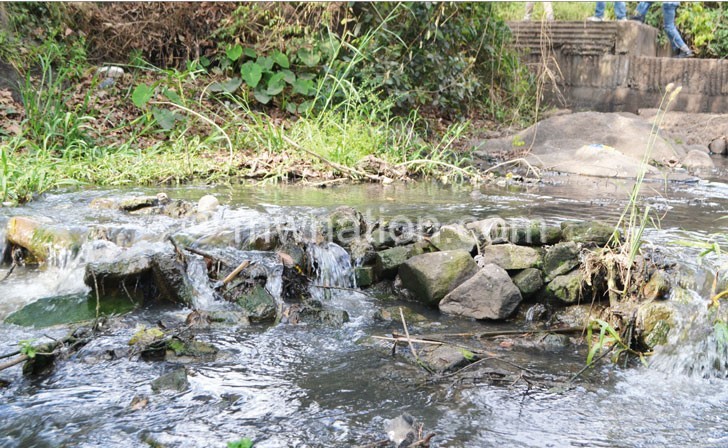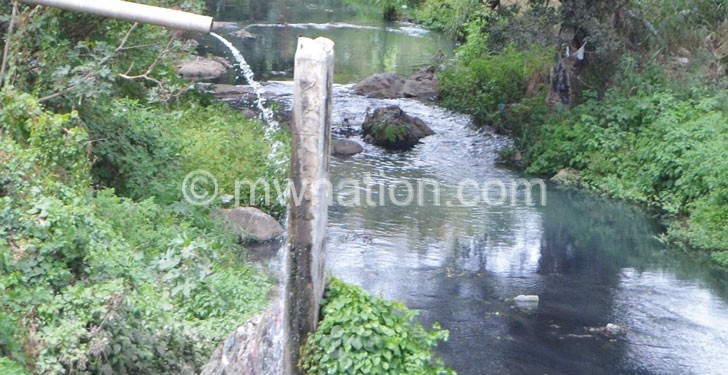Water polluters face jail, penalties
While officers in water boards , city councils and companies, who make people eat feaces stand to be fined K50 million and serve 15 years in jail, and companies risk having their operating licences revoked, experts say weak democratic institutions and policies militate against set standards to right such wrongs.
The country ’s water system is largely viewed to be heavily polluted with faecal matter from sewer systems, pit latrines and septic tanks, and metals and chemicals from industrial effluent as revealed by our sister newspapers The Nation and Weekend Nation, something that was precipitated by a debacle in Area 18B in Lilongwe, where residents have been drinking water contaminated with sewage.

Though government ministries have been mostly silent on the matter, and had not responded to our questionnaire on the water contamination as we went to press, Clauses in the National Environment Act, which President Peter Mutharika assented to this year, indicate punitive measures that could be unleashed on officers that fail to manage waste, leading to water pollution.
Section 102 of the Environmental Management Act says any person who fails to manage hazardous substances, materials processes and wastes in accordance with this Act knowingly or fraudulently mislabels wastes or chemicals aids or abets the illegal trafficking in wastes, chemicals or hazardous substances or waste, commits an offence and shall on conviction, be liable to a fine of K50 million and imprisonment for 15 years.
Section 61 of the Act, declares that a person shall not discharge or emit effluent into the aquatic environment except under a licence issued by the authority, and subject to such conditions as the authority shall determine and that any person who owns or operates an industrial undertaking shall discharge any effluent or other pollutants originating from the trade or industrial undertaking only into existing sewerage system after pre-treatment to meet sewerage discharge standards.

“The authority may revoke any licence issued under this section if the licencee fails to comply with the conditions of the licence or any provision of this part provided that no licence shall be revoked without the licencee being given a reasonable opportunity to be heard.
“The authority may, by notice published in the Gazette prescribed such fees as it shall deem necessary for the monitoring, cleaning up, removing or disposing of effluent discharged or emitted into the aquatic environment.
Any person who contravenes this section commits an offence and shall be liable on conviction to a fine of K10 million and to imprisonment for l0 years.
But Section 8.1 of National Water Policy empowers the Ministry of Water (currently Agriculture and Irrigation) to monitor in terms of quality and quantity assess, plan, develop, conserve, allocate and protect water resources for utilisation in the social and economic sector of production and service.

The policy also empowers water utilities to develop and control waterworks for delivery, distribution and management of potable water supply, and to collect, transport, treat and dispose wastewater and promote sanitation services.
However, the water policy contradicts the Second Schedule of the Local Government Act on additional functions of the councils, which empowers them to establish, maintain and manage services for “the collection and removal and protection treatment of solid and liquid waste, and the disposal thereof whether within or without it its area and may compel the use of its services by anybody of persons to whom the services are available.”
The Act also mandates councils to compel and regulate the provision, construction, use, maintenance and repair of drains, latrines and receptacles for solid and liquid waste and the connection of any premises with any public sewer or drain and to require the use of any sanitary service under its control and regulate the methods of dealing with soil or solid or liquid waste of any description whatsoever: “Provided that nothing in this paragraph shall require an assembly [council] to accept for disposal any solid or liquid waste which in the opinion of the assembly are hazardous or are likely to be deleterious to the operations of any sewage treatment, plant or land fill site or which may contaminate any ground water.”
Water sanitation and hygiene expert Michael Chimaliza, in an interview yesterday, said failure by policies to talk to each other might lead to government’s inability to manage water and sanitation in the country.
Chimaliza said there are at least three policy documents that are bringing confusion in the water and sanitation, and he called for Parliament to harmonise the three policies and come up with one that would address the current challenges.
He said the there was a problem on policy implementation and on who was in charge of water, hygiene and sanitation in Malawi as three ministries are empowered to take charge.
The Ministry of Agriculture and Irrigation through water boards was empowered to managed water supply and waste water management while the Ministry of Local Government has also the power to take charge of waste water management while the Ministry of Health is empowered to inspect water.
“The problem is on policy implementation. Policies are contradicting and players are running away from responsibilities. Councils and local government insist on managing the waste matters, but they have no capacity while water boards are not willing to take up the responsibility. Someone is sleeping on the job,” he said.
Chimaliza said from several meetings he has attended, Ministry of Local Government officials believe that water boards have no capacity considering that they are already failing to provide water in cities and towns.
Catholic University’s political science lecturer Nandine Patel said the country faces two challenges in terms of implementing policies; these are weak democratic institutions as well as crisis management.
“In general, we have democratic institutions that are weak. They lack human, technical and financial resources to implement policies,” she said.
Patel also said the country is run on crisis management approach whenever there is a crisis resources are reallocated to manage the crisis, that makes other sectors suffer.
“There country has development gaps, not because of wars, but weak democratic institutions and crisis management approach,” she said.
Institute for Policy Interaction (IPI) executive director Rafik Hajat said Malawi especially in water and sanitation sector has been affected by outdated systems and population increase.
“The country lacks planning and implementation. Corruption takes a major part. There is a need to develop a national plan that would be implemented in a transparent and inclusive manner,” he said.
Minister of Agriculture, Irrigation and Water Development Joseph Mwanamvekha said he has called for a stakeholder’s meeting to comprehend the matter.





